- Home
- L. M. Montgomery
Anne of Avonlea Page 14
Anne of Avonlea Read online
Page 14
XIV
A Danger Averted
Anne, walking home from the post office one Friday evening, was joinedby Mrs. Lynde, who was as usual cumbered with all the cares of churchand state.
"I've just been down to Timothy Cotton's to see if I could get AliceLouise to help me for a few days," she said. "I had her last week, for,though she's too slow to stop quick, she's better than nobody. Butshe's sick and can't come. Timothy's sitting there, too, coughing andcomplaining. He's been dying for ten years and he'll go on dying forten years more. That kind can't even die and have done with it . . . theycan't stick to anything, even to being sick, long enough to finish it.They're a terrible shiftless family and what is to become of them Idon't know, but perhaps Providence does."
Mrs. Lynde sighed as if she rather doubted the extent of Providentialknowledge on the subject.
"Marilla was in about her eyes again Tuesday, wasn't she? What did thespecialist think of them?" she continued.
"He was much pleased," said Anne brightly. "He says there is a greatimprovement in them and he thinks the danger of her losing her sightcompletely is past. But he says she'll never be able to read much ordo any fine hand-work again. How are your preparations for your bazaarcoming on?"
The Ladies' Aid Society was preparing for a fair and supper, and Mrs.Lynde was the head and front of the enterprise.
"Pretty well . . . and that reminds me. Mrs. Allan thinks it would be niceto fix up a booth like an old-time kitchen and serve a supper of bakedbeans, doughnuts, pie, and so on. We're collecting old-fashioned fixingseverywhere. Mrs. Simon Fletcher is going to lend us her mother's braidedrugs and Mrs. Levi Boulter some old chairs and Aunt Mary Shaw will lendus her cupboard with the glass doors. I suppose Marilla will let us haveher brass candlesticks? And we want all the old dishes we can get. Mrs.Allan is specially set on having a real blue willow ware platter if wecan find one. But nobody seems to have one. Do you know where we couldget one?"
"Miss Josephine Barry has one. I'll write and ask her if she'll lend itfor the occasion," said Anne.
"Well, I wish you would. I guess we'll have the supper in about afortnight's time. Uncle Abe Andrews is prophesying rain and storms forabout that time; and that's a pretty sure sign we'll have fine weather."
The said "Uncle Abe," it may be mentioned, was at least like otherprophets in that he had small honor in his own country. He was, infact, considered in the light of a standing joke, for few of his weatherpredictions were ever fulfilled. Mr. Elisha Wright, who labored underthe impression that he was a local wit, used to say that nobody inAvonlea ever thought of looking in the Charlottetown dailies for weatherprobabilities. No; they just asked Uncle Abe what it was going to betomorrow and expected the opposite. Nothing daunted, Uncle Abe kept onprophesying.
"We want to have the fair over before the election comes off," continuedMrs. Lynde, "for the candidates will be sure to come and spend lots ofmoney. The Tories are bribing right and left, so they might as well begiven a chance to spend their money honestly for once."
Anne was a red-hot Conservative, out of loyalty to Matthew's memory,but she said nothing. She knew better than to get Mrs. Lynde startedon politics. She had a letter for Marilla, postmarked from a town inBritish Columbia.
"It's probably from the children's uncle," she said excitedly, when shegot home. "Oh, Marilla, I wonder what he says about them."
"The best plan might be to open it and see," said Marilla curtly. Aclose observer might have thought that she was excited also, but shewould rather have died than show it.
Anne tore open the letter and glanced over the somewhat untidy andpoorly written contents.
"He says he can't take the children this spring . . . he's been sick mostof the winter and his wedding is put off. He wants to know if we cankeep them till the fall and he'll try and take them then. We will, ofcourse, won't we Marilla?"
"I don't see that there is anything else for us to do," said Marillarather grimly, although she felt a secret relief. "Anyhow they're not somuch trouble as they were . . . or else we've got used to them. Davy hasimproved a great deal."
"His MANNERS are certainly much better," said Anne cautiously, as if shewere not prepared to say as much for his morals.
Anne had come home from school the previous evening, to find Marillaaway at an Aid meeting, Dora asleep on the kitchen sofa, and Davy inthe sitting room closet, blissfully absorbing the contents of a jar ofMarilla's famous yellow plum preserves . . . "company jam," Davy calledit . . . which he had been forbidden to touch. He looked very guilty whenAnne pounced on him and whisked him out of the closet.
"Davy Keith, don't you know that it is very wrong of you to be eatingthat jam, when you were told never to meddle with anything in THATcloset?"
"Yes, I knew it was wrong," admitted Davy uncomfortably, "but plum jamis awful nice, Anne. I just peeped in and it looked so good I thoughtI'd take just a weeny taste. I stuck my finger in . . ." Anne groaned. . . "and licked it clean. And it was so much gooder than I'd ever thoughtthat I got a spoon and just SAILED IN."
Anne gave him such a serious lecture on the sin of stealing plum jamthat Davy became conscience stricken and promised with repentant kissesnever to do it again.
"Anyhow, there'll be plenty of jam in heaven, that's one comfort," hesaid complacently.
Anne nipped a smile in the bud.
"Perhaps there will . . . if we want it," she said, "But what makes youthink so?"
"Why, it's in the catechism," said Davy.
"Oh, no, there is nothing like THAT in the catechism, Davy."
"But I tell you there is," persisted Davy. "It was in that questionMarilla taught me last Sunday. 'Why should we love God?' It says,'Because He makes preserves, and redeems us.' Preserves is just a holyway of saying jam."
"I must get a drink of water," said Anne hastily. When she came back itcost her some time and trouble to explain to Davy that a certain commain the said catechism question made a great deal of difference in themeaning.
"Well, I thought it was too good to be true," he said at last, with asigh of disappointed conviction. "And besides, I didn't see when He'dfind time to make jam if it's one endless Sabbath day, as the hymnsays. I don't believe I want to go to heaven. Won't there ever be anySaturdays in heaven, Anne?"
"Yes, Saturdays, and every other kind of beautiful days. And every dayin heaven will be more beautiful than the one before it, Davy," assuredAnne, who was rather glad that Marilla was not by to be shocked.Marilla, it is needless to say, was bringing the twins up in thegood old ways of theology and discouraged all fanciful speculationsthereupon. Davy and Dora were taught a hymn, a catechism question, andtwo Bible verses every Sunday. Dora learned meekly and recited like alittle machine, with perhaps as much understanding or interest as if shewere one. Davy, on the contrary, had a lively curiosity, and frequentlyasked questions which made Marilla tremble for his fate.
"Chester Sloane says we'll do nothing all the time in heaven but walkaround in white dresses and play on harps; and he says he hopes he won'thave to go till he's an old man, 'cause maybe he'll like it better then.And he thinks it will be horrid to wear dresses and I think so too. Whycan't men angels wear trousers, Anne? Chester Sloane is interested inthose things, 'cause they're going to make a minister of him. He's gotto be a minister 'cause his grandmother left the money to send him tocollege and he can't have it unless he is a minister. She thought aminister was such a 'spectable thing to have in a family. Chester sayshe doesn't mind much . . . though he'd rather be a blacksmith . . . buthe's bound to have all the fun he can before he begins to be a minister,'cause he doesn't expect to have much afterwards. I ain't going to be aminister. I'm going to be a storekeeper, like Mr. Blair, and keep heapsof candy and bananas. But I'd rather like going to your kind of a heavenif they'd let me play a mouth organ instead of a harp. Do you s'posethey would?"
"Yes, I think they would if you wanted it," was all Anne could trustherself to say.
The A.V.I.S. met at Mr. Harmon And
rews' that evening and a fullattendance had been requested, since important business was to bediscussed. The A.V.I.S. was in a flourishing condition, and had alreadyaccomplished wonders. Early in the spring Mr. Major Spencer had redeemedhis promise and had stumped, graded, and seeded down all the road frontof his farm. A dozen other men, some prompted by a determination not tolet a Spencer get ahead of them, others goaded into action by Improversin their own households, had followed his example. The result wasthat there were long strips of smooth velvet turf where once had beenunsightly undergrowth or brush. The farm fronts that had not been donelooked so badly by contrast that their owners were secretly shamed intoresolving to see what they could do another spring. The triangle ofground at the cross roads had also been cleared and seeded down, andAnne's bed of geraniums, unharmed by any marauding cow, was already setout in the center.
Altogether, the Improvers thought that they were getting on beautifully,even if Mr. Levi Boulter, tactfully approached by a carefully selectedcommittee in regard to the old house on his upper farm, did bluntly tellthem that he wasn't going to have it meddled with.
At this especial meeting they intended to draw up a petition to theschool trustees, humbly praying that a fence be put around the schoolgrounds; and a plan was also to be discussed for planting a fewornamental trees by the church, if the funds of the society wouldpermit of it . . . for, as Anne said, there was no use in startinganother subscription as long as the hall remained blue. The members wereassembled in the Andrews' parlor and Jane was already on her feet tomove the appointment of a committee which should find out and reporton the price of said trees, when Gertie Pye swept in, pompadoured andfrilled within an inch of her life. Gertie had a habit of being late. . . "to make her entrance more effective," spiteful people said.Gertie's entrance in this instance was certainly effective, for shepaused dramatically on the middle of the floor, threw up her hands,rolled her eyes, and exclaimed, "I've just heard something perfectlyawful. What DO you think? Mr. Judson Parker IS GOING TO RENT ALL THEROAD FENCE OF HIS FARM TO A PATENT MEDICINE COMPANY TO PAINTADVERTISEMENTS ON."
For once in her life Gertie Pye made all the sensation she desired. Ifshe had thrown a bomb among the complacent Improvers she could hardlyhave made more.
"It CAN'T be true," said Anne blankly.
"That's just what _I_ said when I heard it first, don't you know," saidGertie, who was enjoying herself hugely. "_I_ said it couldn't be true. . . that Judson Parker wouldn't have the HEART to do it, don't you know.But father met him this afternoon and asked him about it and he said itWAS true. Just fancy! His farm is side-on to the Newbridge road and howperfectly awful it will look to see advertisements of pills and plastersall along it, don't you know?"
The Improvers DID know, all too well. Even the least imaginative amongthem could picture the grotesque effect of half a mile of board fenceadorned with such advertisements. All thought of church and schoolgrounds vanished before this new danger. Parliamentary rules andregulations were forgotten, and Anne, in despair, gave up trying to keepminutes at all. Everybody talked at once and fearful was the hubbub.
"Oh, let us keep calm," implored Anne, who was the most excited of themall, "and try to think of some way of preventing him."
"I don't know how you're going to prevent him," exclaimed Jane bitterly."Everybody knows what Judson Parker is. He'd do ANYTHING for money. Hehasn't a SPARK of public spirit or ANY sense of the beautiful."
The prospect looked rather unpromising. Judson Parker and his sisterwere the only Parkers in Avonlea, so that no leverage could be exertedby family connections. Martha Parker was a lady of all too certainage who disapproved of young people in general and the Improversin particular. Judson was a jovial, smooth-spoken man, so uniformlygoodnatured and bland that it was surprising how few friends he had.Perhaps he had got the better in too many business transactions. . .which seldom makes for popularity. He was reputed to be very "sharp"and it was the general opinion that he "hadn't much principle."
"If Judson Parker has a chance to 'turn an honest penny,' as he sayshimself, he'll never lose it," declared Fred Wright.
"Is there NOBODY who has any influence over him?" asked Annedespairingly.
"He goes to see Louisa Spencer at White Sands," suggested Carrie Sloane."Perhaps she could coax him not to rent his fences."
"Not she," said Gilbert emphatically. "I know Louisa Spencer well. Shedoesn't 'believe' in Village Improvement Societies, but she DOES believein dollars and cents. She'd be more likely to urge Judson on than todissuade him."
"The only thing to do is to appoint a committee to wait on him andprotest," said Julia Bell, "and you must send girls, for he'd hardly becivil to boys . . . but _I_ won't go, so nobody need nominate me."
"Better send Anne alone," said Oliver Sloane. "She can talk Judson overif anybody can."
Anne protested. She was willing to go and do the talking; but she musthave others with her "for moral support." Diana and Jane were thereforeappointed to support her morally and the Improvers broke up, buzzinglike angry bees with indignation. Anne was so worried that she didn'tsleep until nearly morning, and then she dreamed that the trustees hadput a fence around the school and painted "Try Purple Pills" all overit.
The committee waited on Judson Parker the next afternoon. Anne pleadedeloquently against his nefarious design and Jane and Diana supported hermorally and valiantly. Judson was sleek, suave, flattering; paid themseveral compliments of the delicacy of sunflowers; felt real bad torefuse such charming young ladies . . . but business was business;couldn't afford to let sentiment stand in the way these hard times.
"But I'll tell what I WILL do," he said, with a twinkle in his light,full eyes. "I'll tell the agent he must use only handsome, tasty colors. . . red and yellow and so on. I'll tell him he mustn't paint the adsBLUE on any account."
The vanquished committee retired, thinking things not lawful to beuttered.
"We have done all we can do and must simply trust the rest toProvidence," said Jane, with an unconscious imitation of Mrs. Lynde'stone and manner.
"I wonder if Mr. Allan could do anything," reflected Diana.
Anne shook her head.
"No, it's no use to worry Mr. Allan, especially now when the baby's sosick. Judson would slip away from him as smoothly as from us, althoughhe HAS taken to going to church quite regularly just now. That is simplybecause Louisa Spencer's father is an elder and very particular aboutsuch things."
"Judson Parker is the only man in Avonlea who would dream of rentinghis fences," said Jane indignantly. "Even Levi Boulter or Lorenzo Whitewould never stoop to that, tightfisted as they are. They would have toomuch respect for public opinion."
Public opinion was certainly down on Judson Parker when the facts becameknown, but that did not help matters much. Judson chuckled to himselfand defied it, and the Improvers were trying to reconcile themselves tothe prospect of seeing the prettiest part of the Newbridge road defacedby advertisements, when Anne rose quietly at the president's callfor reports of committees on the occasion of the next meeting of theSociety, and announced that Mr. Judson Parker had instructed her toinform the Society that he was NOT going to rent his fences to thePatent Medicine Company.
Jane and Diana stared as if they found it hard to believe their ears.Parliamentary etiquette, which was generally very strictly enforced inthe A.V.I.S., forbade them giving instant vent to their curiosity, butafter the Society adjourned Anne was besieged for explanations. Anne hadno explanation to give. Judson Parker had overtaken her on the road thepreceding evening and told her that he had decided to humor the A.V.I.S.in its peculiar prejudice against patent medicine advertisements. Thatwas all Anne would say, then or ever afterwards, and it was the simpletruth; but when Jane Andrews, on her way home, confided to Oliver Sloaneher firm belief that there was more behind Judson Parker's mysteriouschange of heart than Anne Shirley had revealed, she spoke the truthalso.
Anne had been down to old Mrs. Irving's on the shore road the precedingevening and h
ad come home by a short cut which led her first over thelow-lying shore fields, and then through the beech wood below RobertDickson's, by a little footpath that ran out to the main road just abovethe Lake of Shining Waters . . . known to unimaginative people as Barry'spond.
Two men were sitting in their buggies, reined off to the side of theroad, just at the entrance of the path. One was Judson Parker; the otherwas Jerry Corcoran, a Newbridge man against whom, as Mrs. Lynde wouldhave told you in eloquent italics, nothing shady had ever been PROVED.He was an agent for agricultural implements and a prominent personagein matters political. He had a finger . . . some people said ALL hisfingers . . . in every political pie that was cooked; and as Canada wason the eve of a general election Jerry Corcoran had been a busy manfor many weeks, canvassing the county in the interests of his party'scandidate. Just as Anne emerged from under the overhanging beech boughsshe heard Corcoran say, "If you'll vote for Amesbury, Parker . . . well,I've a note for that pair of harrows you've got in the spring. I supposeyou wouldn't object to having it back, eh?"
"We . . . ll, since you put it in that way," drawled Judson with agrin, "I reckon I might as well do it. A man must look out for his owninterests in these hard times."
Both saw Anne at this moment and conversation abruptly ceased. Annebowed frostily and walked on, with her chin slightly more tilted thanusual. Soon Judson Parker overtook her.
"Have a lift, Anne?" he inquired genially.
"Thank you, no," said Anne politely, but with a fine, needle-likedisdain in her voice that pierced even Judson Parker's none toosensitive consciousness. His face reddened and he twitched his reinsangrily; but the next second prudential considerations checked him. Helooked uneasily at Anne, as she walked steadily on, glancing neither tothe right nor to the left. Had she heard Corcoran's unmistakableoffer and his own too plain acceptance of it? Confound Corcoran! Ifhe couldn't put his meaning into less dangerous phrases he'd getinto trouble some of these long-come-shorts. And confound redheadedschool-ma'ams with a habit of popping out of beechwoods where they hadno business to be. If Anne had heard, Judson Parker, measuring her cornin his own half bushel, as the country saying went, and cheating himselfthereby, as such people generally do, believed that she would tellit far and wide. Now, Judson Parker, as has been seen, was not overlyregardful of public opinion; but to be known as having accepted a bribewould be a nasty thing; and if it ever reached Isaac Spencer's earsfarewell forever to all hope of winning Louisa Jane with her comfortableprospects as the heiress of a well-to-do farmer. Judson Parker knewthat Mr. Spencer looked somewhat askance at him as it was; he could notafford to take any risks.
"Ahem . . . Anne, I've been wanting to see you about that little matter wewere discussing the other day. I've decided not to let my fences tothat company after all. A society with an aim like yours ought to beencouraged."
Anne thawed out the merest trifle.
"Thank you," she said.
"And . . . and . . . you needn't mention that little conversation of minewith Jerry."
"I have no intention of mentioning it in any case," said Anne icily, forshe would have seen every fence in Avonlea painted with advertisementsbefore she would have stooped to bargain with a man who would sell hisvote.
"Just so . . . just so," agreed Judson, imagining that they understoodeach other beautifully. "I didn't suppose you would. Of course, I wasonly stringing Jerry . . . he thinks he's so all-fired cute and smart.I've no intention of voting for Amesbury. I'm going to vote for Grant asI've always done . . . you'll see that when the election comes off. I justled Jerry on to see if he would commit himself. And it's all right aboutthe fence . . . you can tell the Improvers that."
"It takes all sorts of people to make a world, as I've often heard, butI think there are some who could be spared," Anne told her reflectionin the east gable mirror that night. "I wouldn't have mentioned thedisgraceful thing to a soul anyhow, so my conscience is clear on THATscore. I really don't know who or what is to be thanked for this. _I_did nothing to bring it about, and it's hard to believe that Providenceever works by means of the kind of politics men like Judson Parker andJerry Corcoran have."

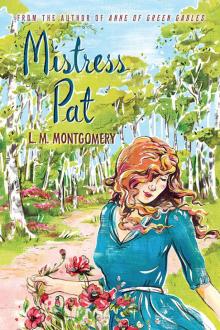 Mistress Pat
Mistress Pat A Tangled Web
A Tangled Web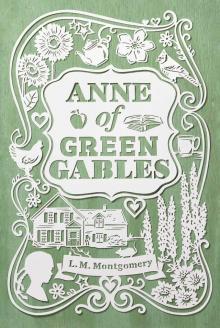 Anne of Green Gables
Anne of Green Gables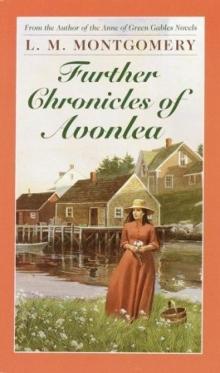 Further Chronicles of Avonlea
Further Chronicles of Avonlea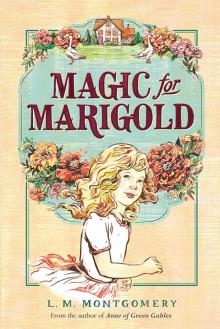 Magic for Marigold
Magic for Marigold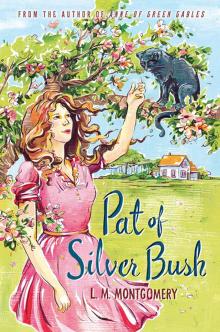 Pat of Silver Bush
Pat of Silver Bush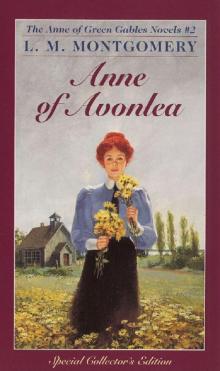 Anne of Avonlea
Anne of Avonlea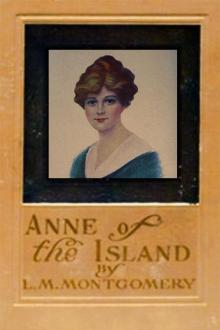 Anne of the Island
Anne of the Island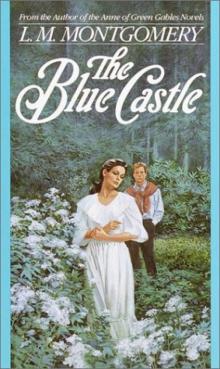 The Blue Castle
The Blue Castle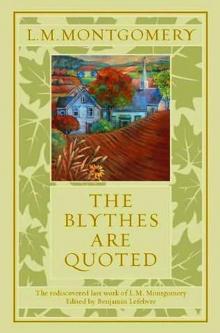 The Blythes Are Quoted
The Blythes Are Quoted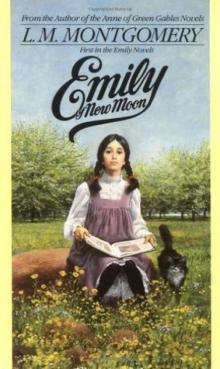 Emily of New Moon
Emily of New Moon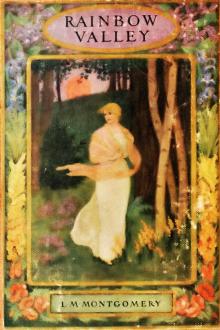 Rainbow Valley
Rainbow Valley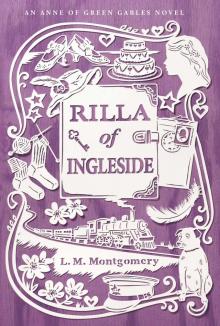 Rilla of Ingleside
Rilla of Ingleside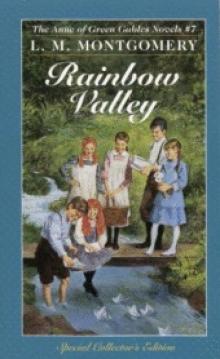 07 - Rainbow Valley
07 - Rainbow Valley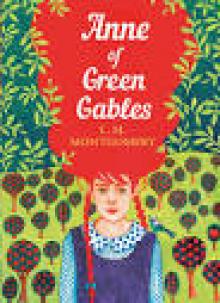 Anne of Green Gables (Penguin)
Anne of Green Gables (Penguin)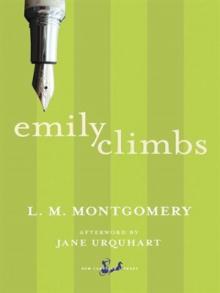 Emily Climbs
Emily Climbs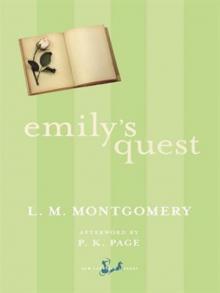 Emily's Quest
Emily's Quest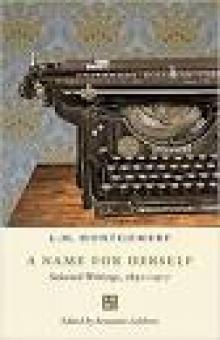 A Name for Herself
A Name for Herself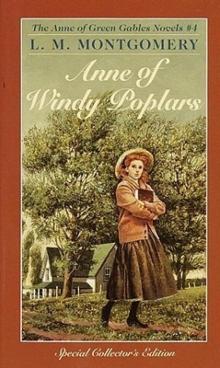 Anne of Windy Poplars
Anne of Windy Poplars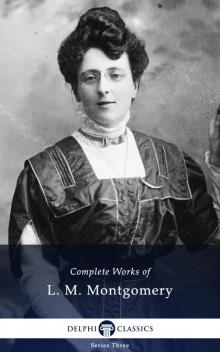 The Complete Works of L M Montgomery
The Complete Works of L M Montgomery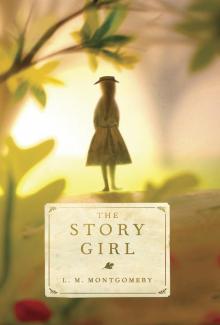 The Story Girl
The Story Girl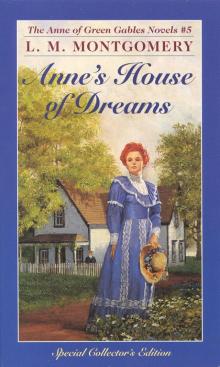 Anne's House of Dreams
Anne's House of Dreams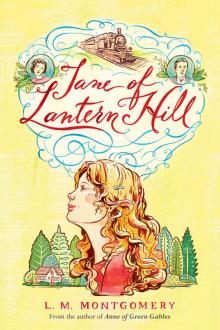 Jane of Lantern Hill
Jane of Lantern Hill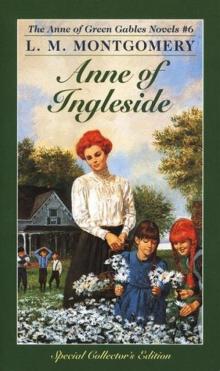 Anne of Ingleside
Anne of Ingleside